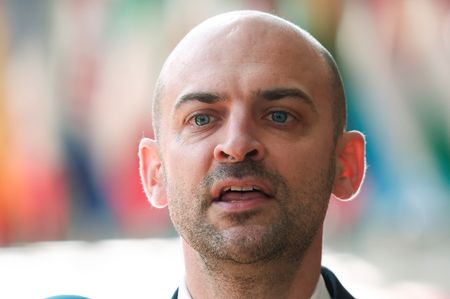By Andrea Mandala and Valentina Za
TURIN, Italy (Reuters) – The Bank of Italy will carefully screen proposed bank takeover bids that will ultimately be decided by investors, but it cannot be expected to give a running commentary on them like “in a talk show,” the central bank governor said on Saturday.
In his first remarks on the M&A wave rocking Italian finance, Governor Fabio Panetta said the deals involved “hundreds of thousands of employees, millions of savers and banks that work also in other countries” making a detailed analysis, jointly with other supervisors, including at a European level, necessary.
“It would be naive to imagine the Bank of Italy could comment on these deals as if we were in a talk show,” Panetta said. “These deals require a complex, careful analysis of their effects and of the documents, which in some cases are not even all there yet.”
In the text of his speech delivered at Italy’s annual Assiom-Forex conference, Panetta said supervisors checked whether the transactions created “a viable, efficient” bank able to operate in a “sound and prudent” manner.
“Subject to these criteria, the outcome of M&A transactions is ultimately determined by market dynamics and shareholder decisions,” he said.
The M&A wave could Italy narrow a gap with other European countries in terms of its banks’ size, he added.
“While scale in banking generally brings both advantages and some well-known challenges, these transactions can be seen within the broader perspective of the European market’s integration and consolidation,” Panetta said.
Italy’s No.2 bank UniCredit has bid for smaller rival Banco BPM, which in turn is trying to buy fund manager Anima Holding. State-backed Monte dei Paschi di Siena has bid for Mediobanca and BPER Banca for Popolare di Sondrio.
UniCredit has also built a 28% stake in Germany’s Commerzbank, contingent on supervisory approval, and said it could pursue a full takeover.
The upsurge in activity has been driven as banks have accumulated cash in excess of capital thresholds, and the need to cut costs now that falling rates have begun to squeeze lending margins, Panetta said.
(Reporting from Valentina Za and Andrea Mandala, editing by Giselda Vagnoni and Barbara Lewis)











